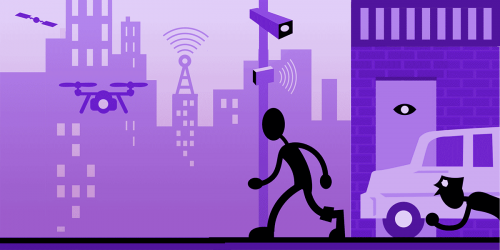Recent months have seen a wave of cities and counties around the country rejecting the use of automated license plate readers in their communities, citing privacy concerns posed by the technology. Added to recent local level victories barring the use of face recognition technologies, it is encouraging to see local governments across the nation lead the way in proactively stemming the tide of invasive surveillance technologies.
Automated license plate readers (ALPRs) are camera systems that scan vehicle license plates and build a searchable database of drivers’ historical travel patterns. ALPRs, often installed on patrol vehicles, streetlights, freeway overpasses and the like, indiscriminately scan every vehicle in a given area and collect data on all drivers regardless of whether their vehicle is under suspicion. Location-based information collected over time can reveal intimate details of a person’s life, such as where they work and live, where they pray, where they seek medical treatment, and who their friends or romantic partners are.
In June, the California State Auditor launched a probe into the use of ALPRs by local law enforcement agencies, which is a valuable step towards improved information about how government agencies are collecting, using, and storing ALPR data. Even better, there’s been a recent surge of cities and counties rejecting ALPRs. This shows the power that local governments and residents have when they speak up and voice concerns over threats to their privacy. That’s how a community can curb the spread of this dangerous technology.
Half Moon Bay, California
In July, the City of Half Moon Bay, California halted considerations regarding ALPRs until the state’s audit is complete. As reported by the Half Moon Bay Review, the City Council began considering the adoption of ALPRs in May. But as planning unfolded, and in light of the state’s audit announcement, many members of the public, as well as city officials, raised privacy concerns. Of particular concern to city councilmembers was the possibility of data collected by local ALPRs being accessed by federal immigration enforcement officials.
Delano, California
The City of Delano, California, recently determined it will no longer pursue using ALPRs, after a series of meetings between law enforcement officials and community members. Kern Sol News reports that for the past several months, the city’s police chief had been considering ALPRs. The chief held a series of community meetings to discuss residents’ privacy concerns. Delano residents and privacy advocates, including the ACLU, voiced concerns about the data being accessed by ICE. They explained that primary ALPR vendor, Vigilant Solutions, has an active contract with ICE that enables the agency to access data collected by the systems. Community members objected that the technology would make the county’s undocumented immigrants vulnerable to deportation. At a city council meeting on July 1, the police chief announced the department would no longer seek ALPRs, because losing public trust outweighed any possible benefits the technology would offer.
Michigan City, Indiana
Also last month, Michigan City, Indiana, chose not to advance a local ordinance that would have allowed the city’s police department to purchase ALPR systems, due to opposition from city residents.
According to the La Porte County Herald-Argus, the ordinance would have allowed the Michigan City Police Department to purchase ALPRs. When the ordinance was brought up for discussion at a city council meeting, nearly every speaker opposed ALPRS. Residents objected that the technology is invasive, and would be used to disproportionately profile and harass people of color.
During these deliberations, members of the city council asked local law enforcement to identify the policies that would regulate the access, retention, and purging of the collected ALPR data. Their response? There weren’t any such controls. The city council voted unanimously to amend the proposed ordinance to cut ALPR authorization.
Suffolk County, New York
In New York, Suffolk County postponed accepting a million-dollar state grant for the purchase of approximately 70 new ALPR cameras, after listening to concerns from local civil liberties groups and residents. Newsday reported that the ALPRs were to be installed in two communities that have seen high rates of gang violence in the past, though gang activity has decreased in these areas in recent years. Local civil liberties groups questioned how collecting and storing data on every car on the road would help combat gang violence. They also objected that it could be used as a dragnet to target low-income residents, people of color, and immigrants. In early July, county officials postponed accepting the grants, citing questions about how data would be stored and the adequacy of ALPRs in reducing crime.
Pima County, Arizona
In Arizona’s border region, the Pima County Board of Supervisors, responding to pressure from privacy advocates, recently rejected federal funds designated for ALPRs. A $1.8 million package of federal Operation Stonegarden grants for border enforcement included funds to purchase ALPRs, according to the Tucson Sentinel. The county already uses several ALPRs for their drug interdiction and auto-theft units, but the new federally-funded ALPRs were intended for indiscriminate collection of location data. Privacy advocates objected that increased use of these technologies could strengthen the ability of private companies, advertisers, debt collectors, and ICE to target vulnerable communities. While the supervisors approved the overall package, it excluded funding for plate readers.
These scenes from around the country demonstrate a growing public awareness of the threats to privacy and civil rights posed by tools of mass surveillance. The actions taken in these five forward-looking cities and counties also show the increasingly powerful role that concerned residents can play in thwarting the spread of invasive technologies in our communities.













